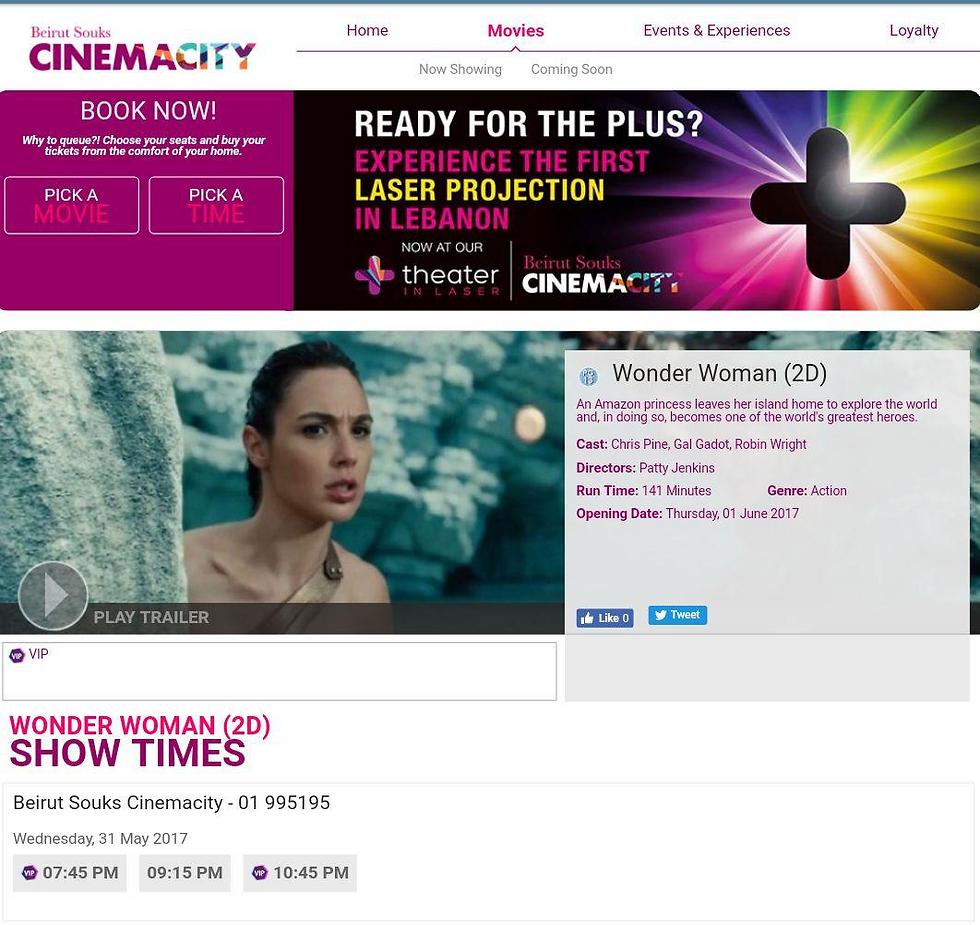
Wonder Woman expected to be pulled from Lebanese cinemas
State movie theaters planned to screen the film starring Israeli actress Gal Gadot; however, the BDS operations in Lebanon appear to have yielded fruit as the Ministry of Economy and Trade in the country turns to the security services to prevent the screening of the movie.
The film Wonder Woman starring Israeli actress Gal Gadot is expected to be pulled from the screens in Lebanon even before its scheduled premiere following successful efforts by the Boycott, Divestment, Sanctions Movement (BDS) in the country.
The latest development signals a turnaround in the wake of reports that the campaign to boycott the movie had thus far proved unsuccessful and announcements that it is due to be screened in theaters across Lebanon.
The Lebanese BDS branch has recently undertaken efforts to prevent the screening despite the continued showing of the movie's trailers and advertisements ahead of its release next month.
On Tuesday, the Lebanese Ministry of Economy and Trade announced that it had sent a letter to the Lebanese General Security to take steps to prevent the screening of the film.
In addition, in April, a letter was sent to the headquarters of the BDS movement in Damascus demanding that Gal Gadot and all films in which she appears be 'blacklisted'. The statement also claimed that the General Secretariat of the Arab League issued a memorandum in April banning the screening of Gadot's films.
The campaign against Wonder Woman began the same month when the BDS movement sent a letter to the Boycott of Israel Office in the Lebanese Economic Ministry in which it was noted that Gadot is a former beauty queen of Israel, who served in the IDF and publicly supported Operation Protective Edge in 2014. Since then, however, movie theaters in Lebanon have promoted the film and called on the public to buy tickets in advance.
The Gadot controversy comes on the backdrop of an internal Lebanese controversy regarding school curriculums in which materials dealing with the Palestinian issue appear to have been removed.
Following an angry article published in the Lebanese Hezbollah-affiliated newspaper Al-Akhbar, Lebanese Education Minister Marwan Hamadeh decided to deal with the issue.
The media in Lebanon, including the Lebanese newspaper, reported that Hamadeh sent a letter to the chairman of the Educational Center for Research and Development in which he asked to reincorporate the Palestinian-related content: "Lebanon's educational and national commitments require that the Palestinian issue be reinstated during the 2017-2018 school year and that any other decision reached in the previous school year be cancelled."
Former Education Minister Elias Bou Saab, who was accused of publishing the controversial decision yesterday, went on the defensive and gave a different version of the events. "There were no classes on the subject to cancel," said Saab.
The former minister of education also claimed that, contrary to what was said in 2016, he tried to re-incorporate the Palestinian issue into the curriculum, but to date the Lebanese government has not approved the unified history book "because of disagreements and political struggles related to the Palestinian issue … Every group that belongs to a particular party markets history from a different point of departure."
There has been a precedent for the Arab League to call for banning Israel-linked films. In 2013, Arab nations acted on calls by the Arab League to ban the terrorism drama, "The Attack," that was shot in Israel, even though it was made by Lebanese-born filmmaker Ziad Doueiri.
In a high profile case in 2009, Gad Elmaleh, a French comedian of Moroccan-Jewish descent, canceled his participation in one of Lebanon's biggest festivals because of concerns for his safety after Hezbollah's TV station alleged he served in the Israeli army.
In 2015, Miss Lebanon, Saly Greige, was in hot water when she appeared in a selfie with Miss Israel, Doron Matalon, in Miami. She later apologized and said the Israeli photobombed her selfie.
Support for the "Wonder Woman" boycott was not unanimous.
Elie Fares, a well-known Lebanese blogger, said the movie already must have been approved to be allowed in theaters in the first place. He said the push for a boycott apparently reflects disputes within the Lebanese government.
"Resist what?" Fares wrote. "A movie about an iconic superhero who's been part of pop culture for over 70 years. A movie in which the lead actress happens to be Israeli but who's not portraying ANYTHING related to her 'country' in any way whatsoever."
Lebanon also has a website called "The Virtual Museum of Censorship" that tracks censored artwork since the 1940s.
Boycott campaign supporter Idriss rebuffed critics, saying that politics is inseparable from art.
"We don't separate art—even romantic movies—from the role of the artist and the intellectual on the ground," he said.
There is no clear mechanism for appealing a ban on artwork, and public campaigns often are the only means to protest such a ban. Religious institutions also have a say in artwork with religious references.
Despite the controversy in Lebanon, "Wonder Woman" is set to open as scheduled Thursday at theaters in the United Arab Emirates, Qatar and Kuwait on Thursday. It is scheduled for release June 22 in Oman and June 29 in Bahrain.
The movie, based on the DC Comics character, has earned acclaim for Gadot for landing a rare leading role for a woman.
Gadot did her mandatory two-year military service in Israel before starting her acting career. She appeared in sequels of the "Fast and Furious" franchise, none of which were banned in Lebanon.
She appeared in other Hollywood movies before appearing as Wonder Woman in last year's "Batman vs. Superman."
The same campaigners sought to bar "Batman vs. Superman," which was shown in Lebanese theaters.













